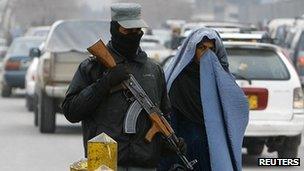Afghan police officer sought over Kabul Nato killings
- Published

Afghanistan's interior ministry has said one of its own employees is suspected of the killing of two senior US Nato officers inside the ministry.
Officials earlier named police intelligence officer Abdul Saboor from Parwan province as the main suspect behind Saturday's attack.
Nato withdrew all its personnel from Afghan ministries after the shooting.
The crisis comes amid deadly protests in the country over the burnings of copies of the Koran by US soldiers.
More than 30 people have been killed in the past five days, and further violence broke out on Sunday despite an appeal for calm from Afghan President Hamid Karzai.
The protests had proved that Afghans were prepared to die for their religion, the president said, adding that they could not allow "enemies of peace" to misuse the strong sentiment.
France said on Sunday it was withdrawing all civilian mentors and advisors from Afghan government institutions in the wake of the attacks. Germany said it had withdrawn all national and international staff from the same institutions.
It comes a day after Nato ordered the withdrawal of all its military advisers from Afghan government ministries in Kabul until further notice.
Police station attack
A grenade was thrown into a Nato base in northern Kunduz province during a protest on Sunday, but Nato said none of its people had been killed. However several Nato personnel were injured and reports quoting Afghan officials put the casualties at a total of seven.
At least one demonstrator was killed and others wounded in the Iman Sahib district of Kunduz, as protesters tried to enter the main city, reports quoting Afghan officials said.
Some 4,000 people took to the streets in Aybal, northern Samangan province, attacking a police station and a US base.
Provincial governor Khairullah Anooash told the BBC several protesters had been hurt, one critically. Other officials said one person had died.
Security clearance
The identities of the dead Nato officers have not been confirmed, but they are believed to have been an American colonel and major.
Reports said the gunman opened fire in a secure room in the ministry - one of the highest security buildings in the capital - at close range.
Nato spokesman Brig Gen Carsten Jacobsen said it was "concerning" that no clear picture had emerged of what happened.
"The interest is as big on the side of the Afghans in the Ministry of the Interior as it is on our side to quickly find out the real circumstances behind this incident," he said.
In a statement, the interior ministry said: "An employee has been identified as a suspect and he has now fled. The interior ministry is trying to arrest the suspected individual."
The ministry did not give a name, but other officials said Mr Saboor, 25, was being sought.
He had served in several Afghan ministries and had worked at the interior ministry for some time, with responsibilities for security arrangements and access to top level intelligence briefings and secure radio communication channels.
His family home in the Salang valley area of Parwan province, north-east Afghanistan, was raided overnight and his relatives in Kabul detained, said officials.
"The fact that he is missing and we assume he fled, makes Abdul Saboor the main suspect for us in this case," said senior interior ministry officials.
One senior Afghan general told the BBC: ''The virus of infiltration has spread like a cancer and it needs an operation. Curing it has not helped."
Nato's commander in Afghanistan Gen John Allen said the attack had been carried out by "a coward whose actions will not go unanswered".
He said that for "obvious force protection reasons" all International Security Assistance Force (Isaf) personnel were being withdrawn from ministries in and around Kabul.
The BBC's Bilal Sarwary in Kabul says the withdrawal will paralyse important areas, such as technical support, intelligence sharing and many ongoing security operations.
It disconnects the co-ordination of the Afghan government with Isaf, says our correspondent, and could not have come at a worse time, with attacks taking place on police and army positions across several provinces.
At least 29 people, including two US soldiers, have died across the country in protest over the Koran burning.
US personnel apparently inadvertently put the books, which reports say had been confiscated from terror suspects, into a rubbish incinerator at Bagram air base, near Kabul.
Muslims consider the Koran the literal word of God and treat each book with deep reverence.
US President Barack Obama has apologised to Mr Karzai for the incident, saying the religious material had been "inadvertently mishandled".
CORRECTION: An earlier version of this story ascribed to Nato spokesman Brig Gen Carsten Jacobsen comments suggesting that after Saturday's shooting, people would have to be "looking over their shoulders" in Afghan ministries. This was an editing error which mistakenly introduced material from another source.